With the first debate for Democratic presidential candidates set for next month, the panelists discussed what critical role the state of Pennsylvania could play in the 2020 race.
Special: What is Pennsylvania's role in the 2020 election?
May. 24, 2019 AT 7:04 p.m. EDT
TRANSCRIPT
Notice: Transcripts are machine and human generated and lightly edited for accuracy. They may contain errors.
ROBERT COSTA: Hello. I’m Robert Costa. And this is the Washington Week Extra.
The first debate for the Democratic presidential race is just over a month away and the campaign is certainly heating up. As the party looks ahead, though, to the general election, a key battleground is, as ever, Pennsylvania, which was won by President Trump in 2016. Democrats are wondering who could win it back. Last Saturday former Vice President Joe Biden campaigned in the state and took direct aim at President Trump.
FORMER VICE PRESIDENT JOSEPH BIDEN: (From video.) Are we a nation that believes ripping children from the arms of their parents at the border?
AUDIENCE MEMBERS: No!
FORMER VICE PRESIDENT JOSEPH BIDEN: (From video.) No, we don’t, but Trump does.
MR. COSTA: President Trump held a rally in the state days later. He then took aim at Biden.
PRESIDENT DONALD TRUMP: (From video.) Don’t forget Biden deserted you. He’s not from Pennsylvania. I guess he was born here but he left you, folks. He left you for another state.
MR. COSTA: “Left you for another state.”
Here to discuss why the Keystone State is so critical, Molly Ball, national political correspondent for TIME magazine; Nancy Cordes, congressional correspondent for CBS News; and Toluse Olorunnipa, White House correspondent for The Washington Post .
Nancy, Pennsylvania, critical state every presidential year. You now have a president who wants desperately to win it again. You have a Democratic candidate in Vice President Biden who has roots in the state. Is this THE battleground for 2020?
NANCY CORDES: It is because what Democrats learned in 2016 is that they can’t count on Florida and North Carolina, and they got more confirmation of that in 2018 with the Senate and gubernatorial races in Florida. So they need Pennsylvania, and they feel like they should win Pennsylvania. They feel that that is Democratic territory, and they were shocked in 2016 when they lost. They always viewed Florida as more of a tossup; they could not believe that they lost Pennsylvania. So there’s clearly work to be done, and you know, the Democratic cognoscenti is without a doubt going to be watching to see who they think can win in Pennsylvania. And that’s surely the reason why the president is already making it clear to Pennsylvanians that Joe Biden, Scranton Joe, is not actually one of them because he picked up stakes and left when he was eight.
MR. COSTA: If you’re going to win Pennsylvania, you got to win the Philadelphia suburbs. Who’s the Democrat at this point who seems to be positioning for that kind of voter? Is it Pete Buttigieg, Senator Harris, Joe Biden?
MOLLY BALL: I have no idea because nobody has any idea which Democratic candidate is best positioned, which is part of why the race is so unsettled right now. You know, we have Biden breaking out to what looks like a commanding lead, but when you talk to Democratic voters, whether it’s, you know, Beltway insider, former Obama administration types, or rank-and-file, you know, Iowa caucus-goers, they are all saying, well, I want to see who emerges. They kind of want someone else to decide who else is interesting in this 24-candidate, depending on how you count, field, and they’re really hanging back to try and evaluate all of the different candidates even as a lot of them sort of park their votes in Biden. But you know, Pennsylvania, as you know, it’s a big state, it’s a complicated state. There’s a lot of ways to win Pennsylvania, and there’s still a very lively sort of theoretical discussion going on about whether Hillary lost because the urban vote in Philadelphia didn’t come out like it did for Obama, or whether it was because those suburban voters broke against Hillary in the – in the final weeks of the race, or whether it was because of unprecedented turnout in the rural areas and the – and the western part of the state around Pittsburgh, and I think it was a combination of all those things. And you have different candidates more obviously appealing to different parts of that strategy.
MR. COSTA: And President Trump just had a rally in central Pennsylvania – Montoursville, Pennsylvania, one of these make America great again rallies. To Molly’s point, is the White House just trying to stoke that rural and exurban base as much as possible with their issue focus and their trips?
TOLUSE OLORUNNIPA: Yeah, that’s exactly what’s happening. President Trump knows the base that he’s going to try to get out. His campaign is specifically trying to target infrequent voters, people who didn’t vote in 2016 or didn’t vote in the past but don’t consider themselves to be Republicans, but consider themselves to be Trumpists – they’re Trump voters. And they’re trying to really juice up that turnout while, as Molly said, Democrats don’t really know exactly which voter they need to target. Is it the urban vote? Is it the suburban vote? Should they be going after moderates who backed Obama and then flipped to Trump and may be up for – up for grabs in 2020? And which candidate should appeal to those types of voters? It’s still to be determined. But on the Republican side it’s very clear that the strategy is to juice up the president’s base.
MR. COSTA: How do they talk about Pennsylvania inside the White House?
MR. OLORUNNIPA: They see it as the end-all, be-all of 2020. You can expect President Trump to be going there very often, as he also will be going to Michigan and Wisconsin. They are going to try to pull off what they thought was impossible in 2016, which was to keep the blue wall, make sure that those Democrats and people who flipped to Trump in 2020 but who may be on the fence now, people who might be impacted by the president’s trade war and who might not be so enthusiastic about voting for President Trump in 2020, see all of the Democratic candidates as socialist and too extreme to go away from sticking with President Trump. So the campaign is really trying to drive a wedge between those voters and the idea of voting for a Democrat by painting all of the Democrats as extremists.
MS. CORDES: There’s another theory about how the president won Pennsylvania, and that is that Mitch McConnell actually won it for him by leaving that Supreme Court seat open and making it a campaign issue, and leading a number of suburban Philadelphia voters who were moderate Republicans, really weren’t big fans of the president, to say that they were voting for him because they cared about that Supreme Court seat and making it a conservative justice. And so the question is, if there – if that isn’t the condition this time around, if there is no Supreme Court seat open, are those voters turned off by the president and not as motivated this time to go out and pull the lever again? And, in fact, are some Democratic voters fired up about the Supreme Court because it looks like abortion may be in – you know, abortion rights may be in jeopardy? Does it actually work the other way this time?
MR. COSTA: Well, you look at the recent polling, Molly, a Quinnipiac from last week of Pennsylvania, Vice President Biden leads President Trump 53 to 42. Senator Sanders leads President Trump 50 to 43. This is without the Supreme Court issue hovering over everything. Do the polls like these show us why Biden is popular among Democratic voters? They want that White House back and he seems to be poised to do well in a state like Pennsylvania.
MS. BALL: Democrats are certainly very focused on electability, because they do want more than anything to beat Trump. But I think the White House would say, well, you know, the polls got it wrong in 2016. There weren’t a lot of polls that showed him winning Pennsylvania in advance of that 2016 vote. But as Toluse said, Pennsylvania also is important because it’s a sort of symbol of the entire Rust Belt, that entire blue wall that Trump burst through like – I always think of it like the Kool-Aid man – in 2016.
But there are not – the signs for Republicans in 2018 were not good in those places. They won, I believe, all of the statewide contests in Michigan, Wisconsin, and Pennsylvania. They won the governorships. They won those Senate seats. They didn’t do well in Ohio. They didn’t do well in Iowa. They think those states may have slipped off of the possible map for Democrats. But to the extent that 2018 may be a sign of things to come, you did see signs that in those states you had a motivated Democratic vote, alongside a motivated Republican vote, but a very motivated Democratic vote, and one that had soured potentially on the president.
MS. CORDES: The other structural advantage that Joe Biden has in Pennsylvania is that while he did leave the state as a child, he’s from Delaware. And the media markets in the eastern part of – half of the state all cover Delaware and Pennsylvania. So –
MR. COSTA: His headquarters is in Philadelphia, isn’t it?
MS. CORDES: Right, exactly. And he takes the – everyone knows he took the Acela for decades. Not necessarily always the Acela. Before that it was just the northeast corridor. But, you know, he took the train, and everyone knows that in eastern Pennsylvania. They all grew up watching him and, you know, as a senator from next door, and then, of course, through eight years as vice president. So this early on in the race he’s a very familiar figure to those voters.
MR. COSTA: Final thing on Pennsylvania. The issue of trade. I’ve been to western Pennsylvania. They speak in very tough terms there about China. They may like the president’s rhetoric, his strategy on fighting China on trade – the tariffs on China and Chinese goods. But what about the effect of the trade policies? As populist as they may be, and popular in theory, could the tariffs also have a negative effect on the president’s political standing in Pennsylvania?
MR. OLORUNNIPA: One word you mentioned was strategy. And I think there’s a big question about whether or not the president has an end game here, or whether he’s just trying to sort of flail about from one strategy to the next and not really have a broader idea of how he’s going to win this trade war. So there are a number of voters that voted for the president who support his tough stance on China, who believe that he should be taking action. But there are a lot of farmers and a lot of people who are saying that we’re several months into this now and it doesn’t seem like things are getting better, and their patience is starting to wear thin.
MR. COSTA: And we saw the administration this week propose billions in subsidies for farmers to try to bring them along.
MS. BALL: I will be fascinated to see what stance the Democratic candidate, whoever that ends up being, takes on trade, because you clearly saw in 2016 that even Hillary Clinton felt she had to renounce some of her more free trade stances in the past, particularly on the TPP. And so this is going to be a big choice for whoever the candidate ends up being. You have Joe Biden so far voicing support for free trade. That’s not a popular point of view in western Pennsylvania, even if there are people who are suffering the effects of the trade war. And so it’ll be interesting to see, do the Democrats try to go back to that sort of populist well in hopes of winning over particularly working-class voters? Or do they decide that this is one of things the president’s wrong about? I mean, so far the biggest critics of the president’s trade war have really been the Republicans. You haven’t heard so much from the Democrats, because their views on this are a little more mixed, I think.
MR. COSTA: That’s it for this edition of the Washington Week Extra. I will note, as a Pennsylvanian, one of the rare Democrats who didn’t run for president is Senator Bob Casey of Pennsylvania, a Democrat. He was the person who considered it and said no thanks, unlike many others in his party.
You can listen to our podcast and webcast wherever you get your podcasts or webcasts, on our website. And while you’re online, check out the Washington Week -ly News Quiz.
I’m Robert Costa. See you next time.
MOST POPULAR

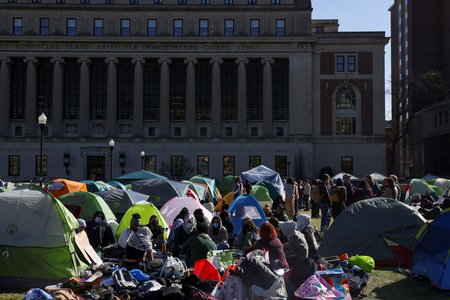
Clip: How protests against Israel and war in Gaza could hurt Biden in November

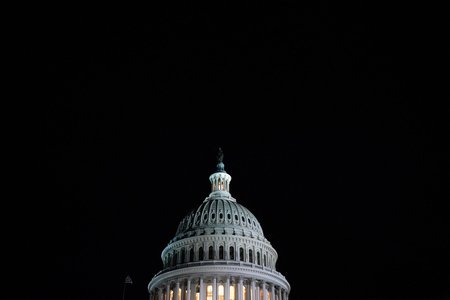
Full Episode: Washington Week with The Atlantic full episode, 4/26/24

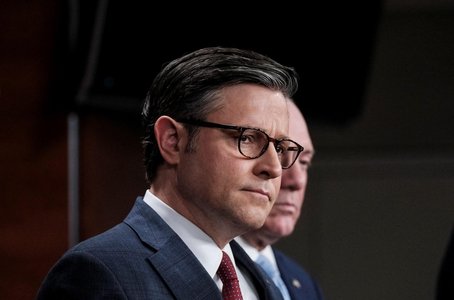
Clip: Johnson risks speakership to get Ukraine aid bill approved
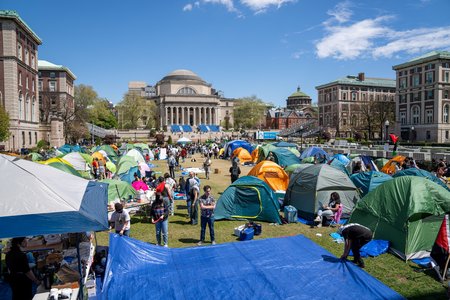
Preview: Coming Up on Washington Week with The Atlantic

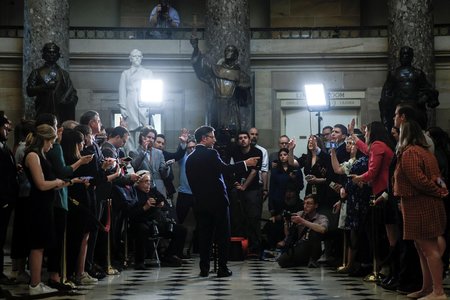
Full Episode: Washington Week with The Atlantic full episode, 4/19/24

© 1996 - 2024 WETA. All Rights Reserved.
PBS is a 501(c)(3) not-for-profit organization

